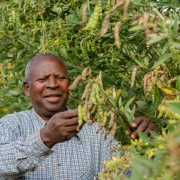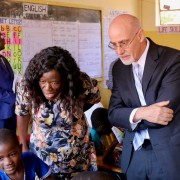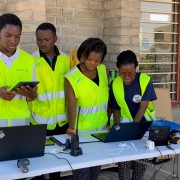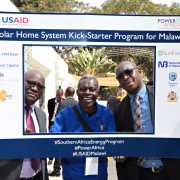Speeches Shim

Despite decades of robust government and donor investments in livelihoods, food security, nutrition, and resilience, over 50 percent of the population of Malawi lives below the poverty line. Many activities have neither sufficiently reduced the number of chronically food and nutrition insecure households nor effectively enhanced the capacity of local and government structures to implement resilience-focused policies and actions. To address these issues, the Government of Malawi has developed a National Resilience Strategy (NRS) to guide investments in agriculture, reduce impacts, improve recovery from shocks, promote household resilience, strengthen management of Malawi’s natural resources, and facilitate effective coordination between government institutions, civil society organizations, and development partners.

U.S. Ambassador to Malawi, Robert Scott and the Secretary of Education, Science and Technology (SEST), Mr. Justin Saidi celebrated International Literacy Day with an event to support the new campaign: “Let’s join hands to read and care for books/Tigwirane manja pwerenga ndi kusamalira mabuku.” Secretary Saidi and U.S. Ambassador to Malawi were joined by representatives from the United States Agency for International Development (USAID), several directorates of the Ministry of Education, Science, and Technology, the Mayor of the City of Lilongwe, Lilongwe Urban’s District Education Manager, teachers and students from Lilongwe Local Education Authority Primary School, and community members.

How to get life-saving services and medical commodities to citizens living in remote areas is one of the biggest questions facing medical service providers the world over. In Malawi, many citizens who live in more remote locations must travel long distances to seek medical attention, have tests run, and/or obtain the medications that they need. There are times when these distances become a life and death matter. Given this, Malawi’s Ministry of Health (MOH) and USAID are exploring the use of aerial drones in a bid to give Malawi new options to increase the availability of and access to lifesaving health commodities, while filling significant service gaps in the public health supply chain.

USAID/Malawi is a phase II CDCS country and is crafting a youth development objective to address a Malawian population where more than 60 percent of citizens are 24 or younger. On July 14th, Agency Youth Coordinator Mike McCabe and two youth experts from the Global Health Office - Linda Sussman and Laurette Cucuzza - traveled to Malawi to: a) consult with USAID/Malawi staff on challenging design aspects of a Youth DO, and b) deliver a two-day Positive Youth Development (PYD) training for key USAID/Malawi technical and implementing partner staff. Twenty-one participants completed the course and are now ready to employ USAID’s PYD methodology to their forthcoming work under the CDCS Youth DO.

On Thursday, July 16, USAID Power Africa staff, Government of Malawi (GoM) officials, and private sector representatives gathered to celebrate the Malawian and international companies that qualified for a total of $2 million in results-based grant financing through “USAID’s Solar Home System Kick-Starter Program for Malawi.” USAID selected SolarWorks!, Vitalite, Yellow Solar and Zuwa Energy from a group of twenty applicants.

Comment
Make a general inquiry or suggest an improvement.